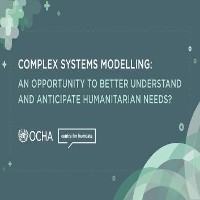
IIASA Research Scholar Asjad Naqvi will speak at the webinar held by the OCHA Centre for Humanitarian Data on modeling disasters impacts, cascading losses and economic complexity.
Complex systems modelling is the application of diverse mathematical, statistical and computational techniques to generate insight into how some of the most complicated physical and natural systems in the world function. In the humanitarian system, this could mean modeling the relationship between drought, food insecurity and displacement, and what that means for overall needs.
In this webinar from the OCHA Centre for Humanitarian Data, colleagues from academia, NGOs and the United Nations will share experiences and provide concrete examples of how complex systems modeling can inform policy-making and response planning in different contexts such as disaster risk reduction or drought-induced displacement.
 © OCHA Center for HumData
© OCHA Center for HumData
The Global Humanitarian Overview 2021 estimates that 235 million people are in need of humanitarian assistance, with 160 million targeted for assistance in over 30 countries. This annual estimate is based on needs assessments that take place in humanitarian crises during the year, an often-challenging process that takes account of multiple sectors. Although Humanitarian Needs Overviews increasingly include scenarios and projections for potential shocks and hazards, the coexistence, correlation, and causality of needs is difficult to capture in complex humanitarian crises.
Upcoming Events
Humboldt University of Berlin
IIASA at Fragile Lives 2024: Evidence for human development, food security, and peace in poly-crises
Odeon Theater, Taborstraße 10, 1020 Vienna
